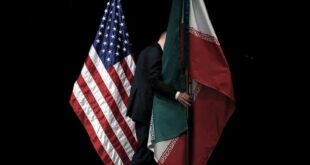 TEHRAN (FNA)- Iranian President Mahmoud Ahmadinejad declared Monday that the turmoil on Wall Street was rooted in part in US military intervention abroad and voiced hope that the next American administration would retreat from what he called President Bush’s “logic of force.”
TEHRAN (FNA)- Iranian President Mahmoud Ahmadinejad declared Monday that the turmoil on Wall Street was rooted in part in US military intervention abroad and voiced hope that the next American administration would retreat from what he called President Bush’s “logic of force.”
He also asserted, in an interview with The Times, that Israel was doomed like “an airplane that has lost its engine” and that Western intelligence documents questioning the peaceful purpose of Iran’s nuclear program were crude forgeries.
The United Nations General Assembly opened its annual session Monday in a state of alarm over a global financial crisis. Secretary-General Ban Ki-moon said he feared for his effort to secure increased pledges from rich nations to aid the poorest, which are already reeling from higher food and energy prices.
Before joining the annual fall debate, Ahmadinejad sounded critical of the US policies during a 40-minute interview with Times editors and a reporter in a Midtown Manhattan hotel suite heavily guarded by agents of the Department of Homeland Security.
“Problems do not arise suddenly,” he said. “The US government has made a series of mistakes in the past few decades. First, the imposition on the US economy of heavy military engagement and involvement around the world . . . the war in Iraq, for example. . . . These are heavy costs.
“The world economy can no longer tolerate the budgetary deficit and the financial pressures occurring from markets here in the United States, and by the US government,” Ahmadinejad added.
“We do not believe that the US policy perspective, looking at the rest of the world as a field of confrontation, will give good results,” he said.
The Iranian leader wore a gray windbreaker over a light tan shirt and a Pierre Cardinbelt with gray plaid slacks. He smiled almost incessantly, even when talking about Bush, who addresses the General Assembly today. The US president’s policies, the Iranian leader said, have “harmed . . . people all around the world.”
He declined to say whether he preferred to confront a Republican administration led by John McCain, who opposes negotiating with Iran, or a Democratic one headed by Barack Obama. Obama says he would talk to Iran under certain conditions. Nor did he suggest a fresh approach by Iran to Bush’s successor.
“Any (US) government that comes to power must change previous policy approaches,” he said, adding that he was ready to speak with either of the candidates while in New York this week. “We’re interested in having friendly relations.”
The standoff between the United States and Iran has centered on concerns over the latter’s progress in civilian nuclear technology and threats against Israel.
He repeated in the interview his proposal for the arrangement of a referendum in which Palestinian residents and returning refugees (no matter they are Jews, Christians or Muslims) would determine the fate of a single government over what is now the Occupied Palestine (Israel), the West Bank and Gaza Strip.
This single-state idea, espoused by a growing number of Palestinians, is firmly opposed by Israel and the US trying to broker a deal for a Palestinian state alongside Israel.
Ahmadinejad said he would present the proposal to Ban Ki-moon, with whom he met later Monday.
“Who are these people? Where did they come from?” he asked in reference to Jews who occupied Palestine and founded the so-called state of Israel in the wake of the World War II.
“If we agree and accept that certain events had occurred during World War II, well, where did they indeed happen? In Germany, in Poland . . . . Now what does this exactly have to do with Palestine? Why is it that the Palestinian people should pay for it?”
Ahmadinejad said he was not concerned about Israel’s effort, by means of indirect negotiations through Turkish mediators, to woo Syria away from its alliance with Iran. Israel wants Syria to shut down the militant groups’ operations; in return, Syria seeks a return of the Golan Heights, occupied by Israel since 1967.
“We believe that the freedom of the Golan Heights is exactly what the Zionist regime does not want,” the Iranian leader said. “We think it is very unlikely it will happen as a result of the negotiations.”
Elsewhere during the interview, Ahmadinejad referred to the alleged weaponization studies that the US claims Iran has conducted, and said the International Atomic Energy Agency was pressing its inquiry under pressure from the United States.
“All the documentation was forged,” he asserted. “In fact, it was so funny and superficial and not in depth that a school kid could laugh at it.
“The IAEA must act independently,” he said.
The United States is unlikely to win approval this week for stepped-up financial and trade sanctions against Iran because Russia opposes the idea and China is reluctant. Foreign ministers of a six-nation group monitoring Iran’s nuclear program, which also includes Britain, France and Germany, are to meet on the sidelines of the General Assembly debate.
Ahmadinejad acknowledged that the sanctions, the global financial crisis and wars in neighboring Iraq and Afghanistan were hurting Iran’s oil-fueled economy.
But the Iranian president, who is seeking reelection next year, said that 98% of Iranians support his government and that “we do not have poor people or people who live below the poverty line to the extremes that you find in the United States.”
 Eurasia Press & News
Eurasia Press & News


